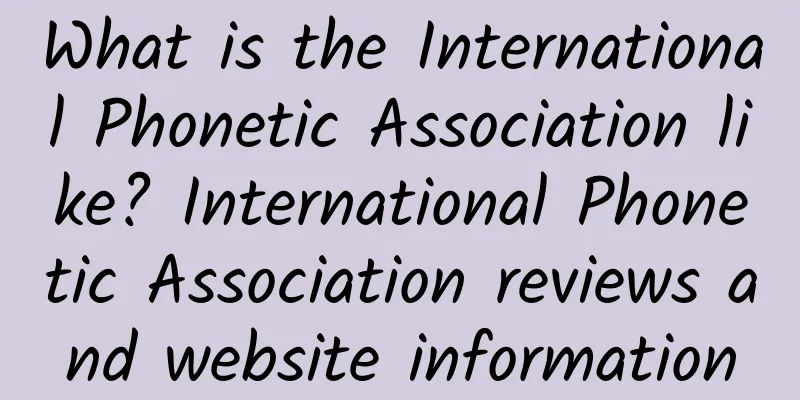What is the International Phonetic Association like? International Phonetic Association reviews and website information

|
What is the website of the International Phonetic Association? The International Phonetic Association (IPA) is an international organization of phonetic workers. It was founded in Paris in 1886. Its main purpose is to promote phonetic research. The association has established a set of international phonetic symbols. Website: www.internationalphoneticassociation.org International Phonetic Association: A global leader in promoting phonetic researchThe International Phonetic Association (IPA) is an international academic organization dedicated to promoting the research and development of phonetics. Founded in Paris in 1886, this historic institution has become one of the important pillars in the field of global phonetics. As a non-profit organization, IPA not only provides professional support for linguists, educators and phonetic researchers, but also provides a standardized tool for language learners and users around the world by developing and promoting the International Phonetic Alphabet (IPA). In this article, we will explore the historical background of the International Phonetic Association, its core mission and goals, the development and application of the International Phonetic Alphabet, and the IPA's contribution to phonetics research around the world. In addition, we will introduce the functions and resources of the IPA official website to help readers better understand this important organization and its profound influence on the development of modern linguistics. Historical Origins: From Paris to the WorldThe history of the International Phonetic Association can be traced back to the late 19th century, when linguistic research was in a period of rapid development. In 1886, a group of scholars who were keen on phonetics research founded this organization in Paris, France. The original purpose was to create a universal phonetic system to more accurately record and describe the pronunciation characteristics of various languages in the world. This goal was groundbreaking at the time because before that, linguists often relied on their own independent symbol systems to record speech, which led to a lot of confusion and misunderstanding. Over time, IPA has grown into a truly international organization. It has attracted linguists, educators and other professionals from related fields from all over the world to join. These members are committed to promoting the development of phonetic research and continuously improving the International Phonetic Alphabet system to enable it to adapt to the ever-changing language environment and needs. The history of IPA not only reflects the development of the field of linguistics, but also witnesses the gradual deepening of human understanding of the diversity and complexity of languages. From a small academic group to an international organization with extensive influence today, IPA has always been at the forefront of linguistic research and has led the development of the field of phonetics. Core Mission and Goal: Connecting Language and ScienceAs a global leader in the field of phonetics, the core mission of the International Phonetic Association is to promote the development of phonetics research and promote the understanding of human language pronunciation through scientific methods. In order to achieve this goal, IPA has set the following key goals:
Through the above efforts, IPA has successfully combined linguistic research with practical applications, promoting theoretical innovation while solving real-life problems. This dual-track strategy enables IPA to maintain its leading position in the highly competitive academic environment. The International Phonetic Alphabet: The Cornerstone of Phonetic ResearchThe International Phonetic Alphabet (IPA) is one of the most important achievements of the International Phonetic Association and a basic tool for global phonetic research. Since its first publication in 1888, the IPA has undergone many revisions and improvements to adapt to the ever-changing language environment and technological advances. The current version contains more than 100 symbols, covering all known human speech characteristics, including vowels, consonants, tones, stress, etc. The design principles of IPA emphasize simplicity and universality. Each symbol corresponds to a specific pronunciation feature and tries to avoid ambiguity. For example, /p/ represents a voiceless consonant without airflow blast, while /b/ represents the corresponding voiced consonant with vibration. This one-to-one relationship makes IPA a highly accurate language recording tool. In practical applications, IPA is widely used in many fields:
In short, IPA is not only a core tool for phonetics research, but also an important part of the bridge between different disciplines. Its existence promotes cross-disciplinary cooperation and provides strong support for solving complex problems. IPA official website: a treasure trove of knowledge and resourcesVisit: www.internationalphoneticassociation.org The official website of the International Phonetic Association is the main window to understand the organization and its work. The website design is simple and clear, aiming to provide the best experience for users. The homepage usually displays the latest news, upcoming events and important announcements. For those who want to learn more about IPA and its activities, this is an indispensable source of information. The main features and resources of the website include:
In addition, the IPA official website also has forums and blog areas to encourage users to share their views, ask questions and interact with others. This open communication method further enhances community cohesion and promotes knowledge dissemination. IPA's contribution to global phonetics researchSince its establishment, the International Phonetic Association has promoted significant progress in phonetic research worldwide through its unremitting efforts. The following are some of its specific contributions:
In summary, the International Phonetic Association is not only an academic organization, but also an important link between the past and the future, theory and practice. All its efforts are contributing to building a more inclusive and understanding world. Conclusion: Looking to the futureSince its establishment in 1886, the International Phonetic Association has gone through a glorious journey of more than a century. During this period, IPA has always adhered to its original intention, committed to promoting the development of phonetics research and benefiting all mankind through the great invention of the International Phonetic Alphabet. Today, with the rapid development of information technology, IPA is facing unprecedented opportunities and challenges. Looking to the future, IPA will continue to play its leading role and explore new frontiers in phonetics research. At the same time, it will also pay more attention to communication with the public so that ordinary people can also feel the charm of linguistics. I believe that with the joint efforts of all members, IPA will surely create more brilliant achievements and make greater contributions to the progress of human civilization. |
>>: How is A-Sketch? A-Sketch review and website information
Recommend
How to make aloe vera juice How to make aloe vera juice
Aloe vera is a special plant that grows in South ...
How to make corn juice How to make corn juice
Corn juice beverage is a nutritious and health-ca...
Nutritional value of winter melon
Winter melon is one of the most common vegetables...
What are the benefits of eating whole grains?
Whole grains is a term that everyone often hears....
Angelica Milkfish Congee
How much do you know about the recipe of Angelica...
How is the Jamaican Embassy in China? Reviews and website information of the Jamaican Embassy in China
What is the website of the Jamaican Embassy in Bei...
The efficacy and function of golden chrysanthemum and the consumption method of golden chrysanthemum
Golden chrysanthemum is a kind of chrysanthemum, ...
The benefits of taking a bath with sea salt The effects and functions of sea salt foot bath
Sea salt is salt extracted from seawater. It can ...
Can girls eat cherry tomatoes during menstruation?
Can girls eat cherry tomatoes during their menstr...
The pros and cons of drinking Coca-Cola
Coke is a very common carbonated beverage in life...
How is Fubra? Fubra review and website information
What is Fubra? Fubra is a well-known American quer...
The efficacy and function of purple dandelion Purple dandelion flower language
Purple dandelion flower language, purple dandelio...
How to distinguish the quality of bird's nest How to distinguish the quality of bird's nest
Many people will find that the price difference o...
How is Gmember Music? Gmember Music Review and Website Information
What is Gmember Music? Gmember is a famous Thai mu...
How to make bulletproof coffee? The advantages and disadvantages of bulletproof coffee
Many people have heard of bulletproof coffee, but...









